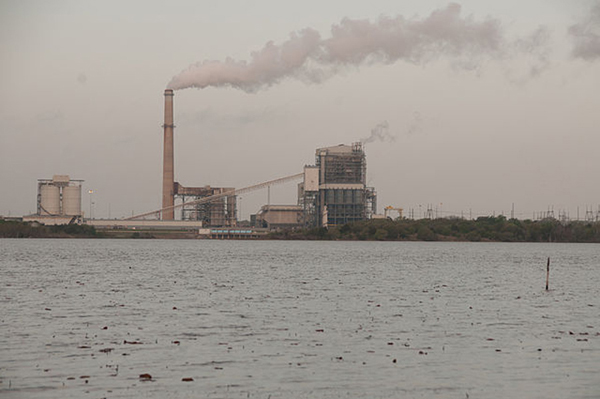- South Texas Students Meet Accordion Music Icons Los Tigres Del Norte In Edinburg Thanks To Khs America/Hohner Alianza Académica Initiative
- Fragile Planet Offers a Nighttime Wildlife Experience
- Falcons Soccer Off & Running
- Cameron County Receives Funds to Improve Two Parks
- Falcons Complete First Half of 32-6A
- School District to Help out Victims of California Wildfires
- Sand Castle Days Continued Despite Unexpected Weather
- Ready for District
- Discussion of Garbage Dumpster Rates, Agreements Between State & City on Highway Regulations, and More
- 31st Annual Shrimp Cook-Off is Right Around the Corner
Texas Cities Leading Transition to Renewables
- Updated: January 18, 2019

In December, the Texas Municipal Power Association announced plans to shutter the Gibbons Creek coal-fired power plant indefinitely due to high operating costs. Photo: Pmelton87/Wikimedia Commons
by Eric Galatas
GEORGETOWN, Texas – In 2018, Georgetown became the first city in Texas to get 100 percent of its electricity from renewable sources, and conservationists are pushing Austin, Bryan, Garland, San Antonio and other municipalities to join some 100 cities nationwide that have made commitments to transition away from fossil fuels.
Cyrus Reed, conservation director of the Sierra Club’s Lone Star Chapter, says more city leaders understand that switching to solar and wind makes economic sense.
“When citizens and cities look into the future, they see that the best option – both for the environment, but also for the pocketbooks of customers – is to sign long-term contracts with renewable energy providers,” Reed points out.
Last year, the city of Denton committed to get 100 percent of its electricity from clean power sources by 2020, and signed three major solar contracts.
In December, the Texas Municipal Power Association announced plans to mothball the Gibbons Creek coal-fired plant, which supplies Denton and three other cities, due to high operating costs.
Fossil fuel advocates say coal and gas are far more reliable than wind and solar, and provide thousands of jobs.
Reed counters that moving away from coal-fired power plants also brings health benefits, especially for people of color and low-income communities that have historically been disproportionately impacted by pollution.
But he agrees that, in the short term, coal and gas-powered plants are necessary to keep electric grids functioning and can’t be shut down overnight.
“But over time – over 10, 20 years – we can do it,” he stresses. “And the secret is wind, solar, plus batteries or other forms of storage. Because obviously the wind doesn’t always blow, the sun doesn’t always shine.”
Reed says the latest report by the Electric Reliability Council of Texas, which manages the electric grid for some three quarters of the Lone Star State, suggests a bright future for renewables.
He says plans for future investments include solar, wind and storage, nothing in coal or nuclear, and only marginal investments in natural gas.
